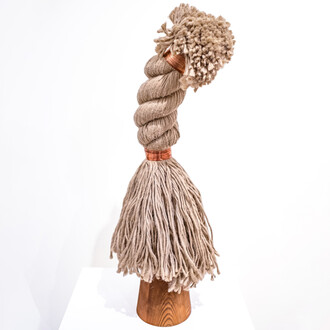Opening on 29 April across Vitrine’s two spaces in Bermondsey, 'The Plumbers (Hygienic Gaze)' is a solo exhibition of work by London-based artist Edwin Burdis. Susie Pentelow interviews the artist to find out more about his new works.
‘The Plumbers’ refers to a collection of life-sized plywood paintings carved out by the artist. A diverse troupe of characters is born and brought to life, granting us a privileged look into the artists' imagination. Immediate questions about the construction of a character are raised in the reflection of the artist that flits through each of the figures. I ask Burdis to talk a bit about how this body of work came about.
"I had been thinking about my past, my past as a young man, a young man who thought a lot about clothes. I have stopped thinking about clothes for a good few years now, which I guess is what happens with age, right? With the detachment/perspective of the years gone by I started on a few drawings or sketches and these started to turn into something a lot more interesting then just me and my past. They needed to come alive, they had to become more real and more here, which is why I made them into life-size cut outs/paintings. They’re called the plumbers for a number of reasons one being that they are a group or gang and like any group or gang they needed a name. One last thing, I am not sure what sex they are.....which seems important."
Burdis describes his “own cast of characters – The players. the singers. the losers and the winners. a band. a bunch. a group. clean water in to the home. clean water forever. boiling hot and ice cold. clean good water for all.”
I am reminded of the lonely figures portrayed in Luigi Pirandello's 'Six Characters in Search of an Author', in which a family of unfinished characters bursts into the rehearsal for a play, demanding that the author complete their story. The act of bringing to life a character from the imagination carries with it the responsibility of the creator. Whilst Burdis' Plumbers were born as autobiographical fragments of his character, they have become something much more powerful in their completion as individually formed personalities. I wonder how Burdis feels about cutting the chord that not only binds The Plumbers to himself, but to each other. One currently resides at Wysing Arts Centre for the group exhibition 'Hey, I'm Mr Poetic' and in the Vitrine Bermondsey Square section of the exhibition, Burdis presents one lone Plumber in contrast to the group of works exhibited in Vitrine’s Bermondsey Street space. How do you feel, I ask, about the works being presented individually as opposed to in a group installation?
"Well, they are after all individuals within a group, so one or two of the plumbers will go off to do there own thing now and then. So I guess I feel fine about it, as long as I get my share of whatever they get up to."
Born in Newcastle, Burdis' career boasts over a decade of significant contribution to the London art scene. Collaborators include Bonnie Camplin, Steven Claydon, Mark Leckey, Keiron Livingstone and Heather Phillipson and his work has been presented internationally in prominent venues including; ICA (London), Tate (London), Wysing Arts Centre (Cambridge), Modern Art (Oxford), Zabludowicz Collection (London), Gavin Brown Enterprise (New York), Grimm Gallery (Amsterdam) and Hayward Gallery Project Space (London). His most recent accomplishment is the award of an Arts Council England Bursary to produce a feature length operatic film work, which will culminate with a major UK tour of the film in late 2014 and 2015 to institutions including MK Gallery, Milton Keynes, Arnolfini, Bristol and Lancaster Institute for the Contemporary Arts (LICA). I ask Burdis about the premise for this work.
"It's an opera about England, a personal view, a sort survey of contemporary England. Not a cynical view but also not lacking in humour (I hope). As we all know humour is a very important part of work/art/life? Anyway, over the past seven months I have set out on a series of journeys across England. On these journeys, I have collected the material: audio recordings of local amateur and semi-professional musicians, bands and choirs, and also shooting footage of countryside, towns and cites. Then I will and I am editing the material in to a feature-length film. I am finding that my mother (who died very recently of multiple myeloma) is a huge part of this work, my mum is sort of guiding me across this land called England."
In the characters of 'The Plumbers’, in his large-scale opera works and throughout his multifaceted practise, Burdis' exploration of English contemporary culture takes the deeply personal into the public realm of a shared cultural consciousness. In this, his work is striking, more than anything, in its enormous generosity. Funny, vulnerable and thought-provoking, Burdis' works reflect on elements of his own life so that they can be read though the lens of a much wider cultural context.



















